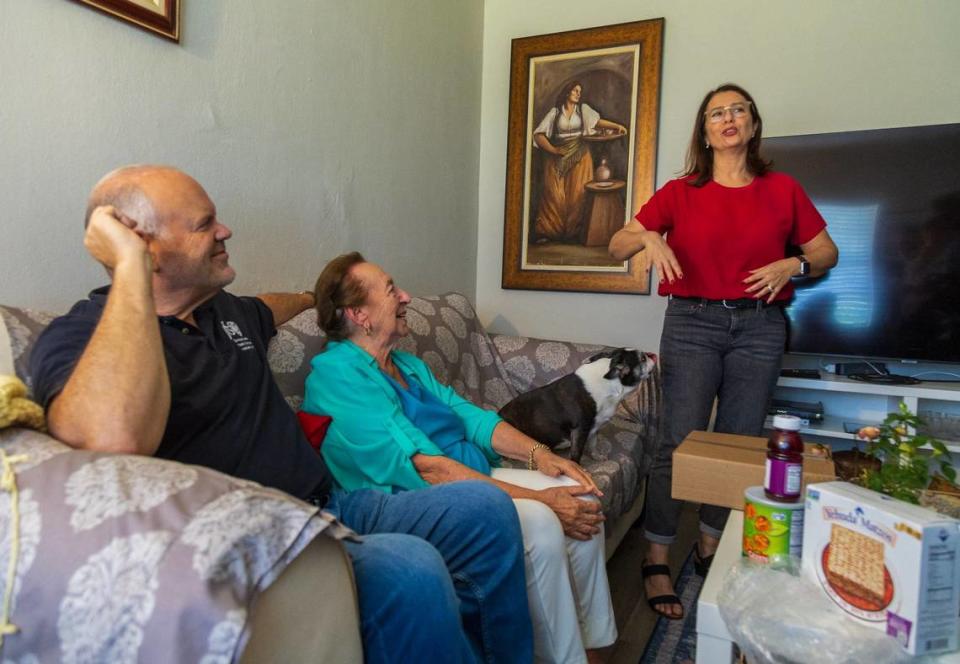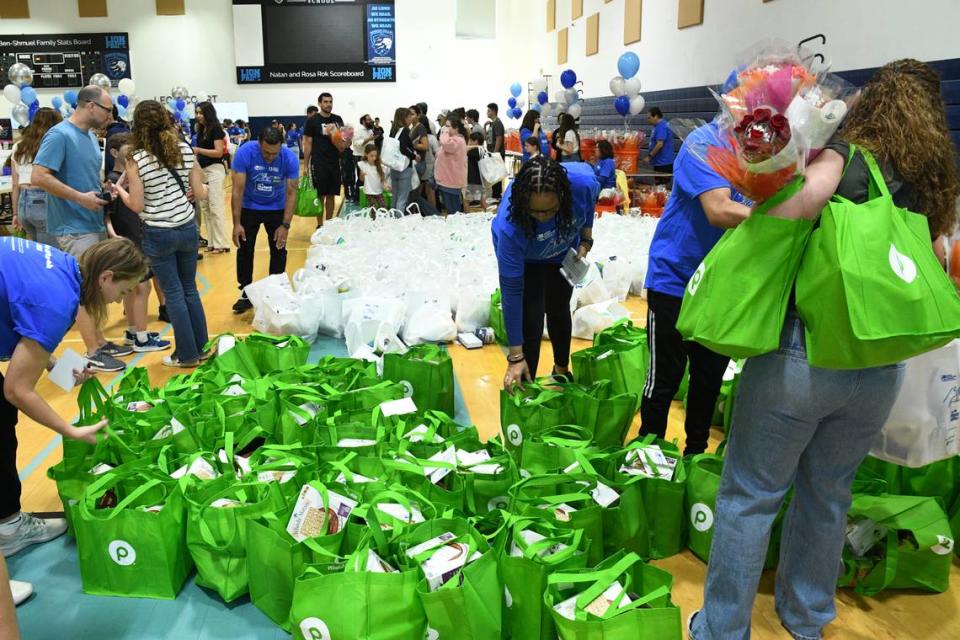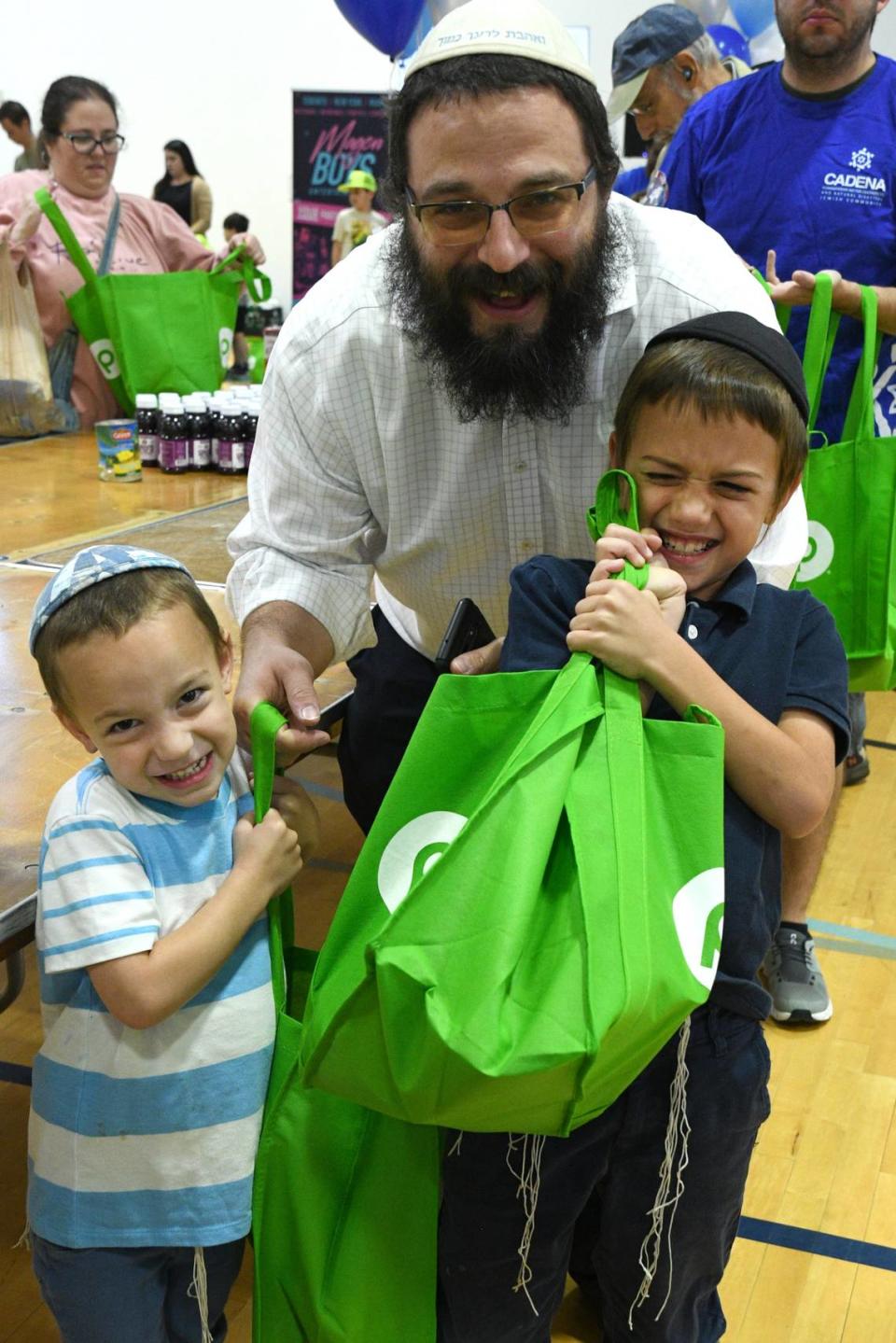For Holocaust survivors, Passover dinners carry deep meaning. SoFla groups help provide it
During Passover, Jewish families across South Florida will sit down to traditional Kosher foods such as gefilte fish, matzo ball soup and potato kugel.
But for some struggling to make ends meet, setting the table for Seder — the dinner celebrated during the first two nights of the Jewish holiday — can be a challenge.
Nonprofit organizations like Goodman Jewish Family Services of Broward County and Jewish Community Services of South Florida are stepping up to ensure low-income families and home-bound seniors — including some Holocaust survivors — don’t go without.
“Passover is a time when Jews come together to celebrate the escape from slavery. It’s about family. It’s about food...” said president and CEO of Goodman Jewish Family Services, Randy Colman. “In our community, there are many individuals ... who don’t really have that family to celebrate with.”
The group does food deliveries that he said “provide a sense of belonging, a sense of home, knowing that people care about them, whether they have family or not.”
On a regular basis, Goodman JFS’s food pantry, called the Dorit & Ben J. Genet Cupboard, serves over 700 food insecure families every month. For Passover, volunteers have worked to pack and deliver nearly 1,300 food packages and meals to those in need. Over 600 of those will be delivered to home-bound seniors and Holocaust survivors.
“Through our food distributions and through our volunteers ... we are the extended family, we’re the ones that bring a little bit of hope, a little bit of happiness, a little bit of sunshine into the homes around the holidays,” Colman said.
Through myriad of programs and services focused on mental and physical health, Goodman JFS supports all people — regardless of their religion — year round. They have a particular focus on helping Holocaust survivors, many of whom live on a fixed income, on a regular basis by connecting them with food, health care and other support they need to live a happy life.
“It’s more than the food we deliver. It’s the caring, it’s the connection, it’s sitting with them and holding their hand and listening to their stories,” said Colman.
Florida has one of the largest Holocaust survivor populations in the country, with 97 percent of the state’s survivors living in the tri-county area of Miami-Dade, Broward and Palm Beach. There are fewer than 50,000 survivors left in the United States, and about 1,500 reside in Broward, according to the Conference on Jewish Material Claims Against Germany, a nonprofit that secures compensation for Holocaust survivors around the world.
Agnes Berger, a Holocaust survivor and one of the recipients of the Seder food packages, was thrilled to receive her package — complete with one of her favorite Passover foods, gefilte fish — at her apartment in Davie on the Friday before Passover.

Born in Budapest in 1935, Berger was just nine years old when the Nazis invaded Hungary in 1944. Her mother was taken to Auschwitz by foot and her father was taken to Bergen Belsen — two of the most notorious concentration camps during the war. After all these years, she recounted the harrowing memories of the Holocaust, the physical and mental trauma of surviving the Budapest Ghetto.
“We were in a basement for I don’t know how many months, but it was a long time,” Berger said. “We had one set of clothes on the body, this was all. The daily feeding was one piece of bread and something to drink.”
Berger recalls being so hungry that her mouth felt like it was glued shut. As children, Berger and her sister experienced extreme starvation and dehydration.
“I cannot put anything in my mouth because my tongue was bleeding. We couldn’t swallow for hours,” she said. “We had no childhood. Nobody was a child there.”
Among all the horrors of her past, Berger said today she feels “very, very blessed” to be with her family over Passover.
“My son, my grandchildren, my great-grandchildren ... When I look at the baby, I say, You know what, I believe in miracles.”
The holiday, which commemorates freedom and the emancipation of the Israelites from bondage in ancient Egypt, holds a different meaning for survivors such as Berger.
“Passover, taking out the importance of religion, is just another day where I remember, I cannot forget it,” she said. “There is no day that you don’t remember these things for a moment, for a second. But, you have to learn to live with that.”
Jewish community steps up
This year, thanks to Broward resident and volunteer, Karen Dennis, many of the care package recipients will receive a hand-written note along with their meal packages. She sponsored an event at her synagogue where children and families could decorate cards in exchange for a treat from an ice cream truck.
“To have that personal touch included in the delivery, I think is very special,” Dennis said.
Dennis has been working behind the scenes at the food pantry since its inception in 2017, raising money, collecting food and putting together care packages. One of the motivators of the work, Dennis said, was the realization that the issue of food insecurity was right in her backyard.
“It was really heartbreaking to find out that there was starvation going on in our community,” she said. “There were people who had to choose between buying baked potatoes for their kids or paying their full electric bill or picking up medication at Publix. That was very disturbing.”
Dennis won’t be stopping the volunteer work anytime soon, and has even gotten her family involved. Her 7-year-old granddaughter helped Dennis make a social media video promoting the food bank fundraiser — an effort that resulted in more donations, from strangers and friends alike.
“It’s a source of great pride and celebration when I sit down to the Seder table, knowing that 640 seniors are also enjoying a meal,” she said.

Years ago, Dennis started using her porch bench, known to other Goodman employees as “the magic bench,” as a drop off point for items for the food cupboard. Her house in Emerald Hills, situated on the corner of 46th Avenue, is along the main road to Publix, making it a perfect location to collect Kosher food year round.
“Nothing made me happier than on Thanksgiving or before Passover, that my portico would be overflowing with bags of non perishable food. I’d open my door in the morning. And I’d see all those collection bags, and it gave me great pleasure.”
Another nonprofit in Miami, Jewish Community Services, held a similar effort called Matzah Mitzvah in early April where over 400 volunteers, including the Israeli Consul General to Miami, came together to package and deliver Passover food and personal hygiene bags to South Florida Holocaust survivors and home-bound seniors.
Together, volunteers young and old packaged matzah, grape juice, gefilte fish, toiletries, and fresh flowers for over 500 recipients. Jewish Community Services has been holding the event for 21 years, providing support and sustenance for those who otherwise wouldn’t be able to afford a Passover meal.
“It is truly our privilege to serve as our community’s safety-net,” said JCS president and CEO Miriam Singer. “With JCS Matzah Mitzvah, frail and vulnerable seniors in our community can enjoy these traditional holiday foods, and receive the personal hygiene items they need, all free of charge.”

At this year’s Mitzvah, Singer said volunteers brought “positive energy” in form of singing, dancing and smiles to the community in the midst of “trauma of the dramatic escalation in anti-semitism and the Gaza War.”
For the volunteers, Singer said the annual event provides a way for them to engage in “Tikkun Olam,” or healing the world with loving acts of kindness.
This story was produced with financial support from Trish and Dan Bell and from donors comprising the South Florida Jewish and Muslim Communities, in partnership with Journalism Funding Partners. The Miami Herald maintains full editorial control of this work.


